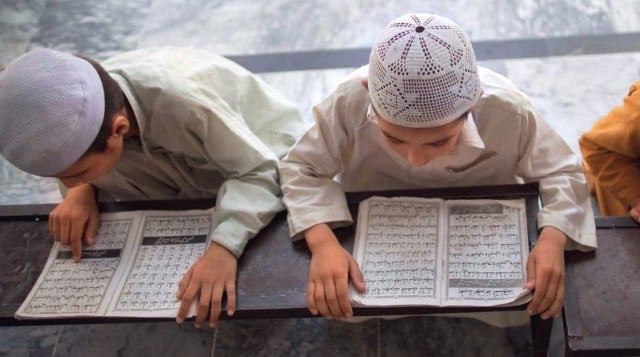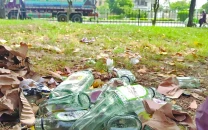When supply meets demand
11-year-old Bakht spends at least six hours a day sitting cross-legged on the floor, memorising the Holy Quran.

“No one cares about that here,” is Badshah’s immediate response. “When registered public schools don’t deliver, parents have no choice but to send them to unregistered madrassas where children at least learn to recite the Holy Quran.”
According to the ministry of religious affairs, Pakistan has at least 14,061 religious institutions, teaching about 1,191,430 students. Unofficial estimates are much higher.
Dr Manzoor Ali Azhari, head of the Institute of Religious Education in Taxila, says that according to some rough estimates, at least 24,000 madrassas are functional across the country in which about 2.7 million students are enrolled.
However, figures are conflicting as according to the Punjab home department alone, there are around 13,500 madrassas of different schools of thought in the province with a student population of approximately 453,670.
Meanwhile, the Sindh home department had registered 900 madrassas in the entire province as of March 2010. However, the presence of at least 70 to 80 madrassas only in Orangi Town, Karachi, bears witness to the fact that most of them are being allowed to run unregistered.
The question of funding
A lot of madrassas charge a nominal fee of Rs50 to 80 that parents in low-income neighbourhoods can often afford. This helps finance the seminaries to a certain extent.
“Sometimes when students can’t pay the fees we ask for chanda (donation) and are able to raise sufficient funds,” says Wali, a teacher at Iqra Islami Tajweedul Quran in Karachi.
But it is not just the low-income neighbourhoods in Karachi, but also localities such as Clifton that have also witnessed a rise in the number of religious schools. And there is no check on what is being taught.
“The government has not even been able to check the number of madrassas that have increased over the past few years and they talk of regulating them? That is just not possible,” comments an activist and president of Pakistan Women’s Foundation for Peace Nargis Rahman.
The curriculum war
In order to implement ‘madrassa reforms’ and revise the curriculum of seminaries across the country, the government should first identify the unregistered madrassas which cannot be held accountable for what they are teaching, says Nargis Rahman.
But Federal Education Secretary Imtiaz Qazi is bent upon implementing the government’s vision of ‘modern madrassas’ without doing much homework. Recently, the ministry decided to introduce 20 subjects in the madrassa curriculum, aiming to lead some five million students across 20,000 madrassas of the country towards scientific and technical education, according to reports.
Clerics have not exactly welcomed the decision.
“We are tired of these repeated ‘reforms’ that governments propose one after the other,” says Mufti Naeem of Jamia Binnoria al Almiya in Karachi. “Governments initiate projects to introduce a ‘secular curriculum’ only to please the West and get some financial aid in return.”
According to Naeem, the government has never been serious about implementing these which was evident in 2002 when funds worth Rs5,759 million lapsed because the education ministry was unable to utilise them for this purpose. “I still remember that former minister for education Zobaida Jalal had promised to provide us with 100 computers for our madrassa back in 2002. I am yet to receive those.”
“Everyone points a finger at our fund-raising mechanism. How come no one questions the government about the money they get from the US?” asks Naeem, refusing to disclose the main source of funding for his madrassa.
According to an estimate, Jamia Binnoria al Almiya spends at least Rs700 per student on a weekly basis. This includes food and lodging. Meanwhile, according to Azhari, around Rs0.15 million are normally spent on a student who graduates with the Dora-e-Hadis degree, equivalent of a BA degree, after spending 14 years in a madrassa.
Immune to government pressure
Mufti Naeem argues that the government has no right to try and regulate the curriculum at his seminary where subjects such as science, mathematics and computer studies are taught. “We are aware of the challenges of the modern world; we are not training our students to be terrorists.”
Jamia Binnoria al Almiya is affiliated with Wafaqul Madaris al Arabia, the governing body of the majority Deobandi madrassas in Pakistan which controls about 8,000 seminaries.
Apart from the Deobands, representatives of other seminary boards – Barelvi, Ahle Hadith, Shia and Jamaat-e-Islami – affiliated with the Ittehad Tanzimat Madaris-e-Deeniya – also refuse to comply when it comes to regulation of their syllabus.
“The government first sponsored these madrassas during Zia’s era because the West demanded so and now they want to modernise religious schools again to please them,” says Barelvi cleric, Maulana Shabbir Abu Talib.
Qari Zakiur Rehman, who heads Jamia Hanfiya Qadariya in Lahore, also feels that blaming madrassas for militancy is propaganda hatched by Western lobbies. He also denies that madrassas get funding from abroad, saying that the schools reach out to philanthropists for donations. Charity, alms, donations, hides on Eid and zakat are the main sources of funding, he says.
However, Al-Azhari, who is a PhD from Al-Azhar University, is dissatisfied with madrassas because of their unwillingness to teach modern subjects.
Regarding funding of these institutions, he says that the majority of madrassas are being supported by Pakistanis whether in the country or abroad.
However, some religious organisations are being funded by Gulf countries, he says, and adds that the ongoing war on terror has negatively affected this kind of fund raising.
Azhari feels that the madrassas, along with the government, need to revamp the system so that they can produce graduates with skills to do well in the modern world.
The future of madrassa students
After graduating from madrassas, students opt for various jobs, in the government as well as the private sector, says Qari Zakur Rehman. The majority of imams in mosques in Europe were educated in Pakistan, he adds.
Meanwhile, according to Mufti Imran Ahmed of Jamia Naeemia, Lahore, many of their students are serving in the police, the army and civil administration.
However, madrassa students seem to feel that they have limited opportunities once they leave the seminaries.
Haider Khan, a student of Jamia al Ashrafia in Islamabad, feels that the education provided in madrassas does not provide the students with means to do well in life. “Seminary students can only work in mosques or madrassas, which is a poor means of earning a living,” he says.
“Most of my friends ended up as maulvis at their neighbourhood mosques and here I am teaching at a madrassa,” says Wali, who graduated from a madrassa in Karachi last year.
However, he adds that owing to limited opportunities of employment in the mainstream market, he is content with what he has. “It is frustrating at times but at the end of the day, at least I am able to put food on the table from the Rs3,500 I earn.”
Militancy
Waqar Ahmed, a boarding student at Jamia Hanfiya Qadariya, says he has been studying at the seminary for the last three years where he is also being taught all subjects. There are no lessons on militancy and terrorism, he adds.
Notables of the vicinity finance this seminary and we were being provided good food and other facilities, says Ahmed. “I belong to Azad Kashmir and come here to get religious education as my parents are poor and they could not afford to send me to school.”
Muhammad Aslam, who received his primary education in his village, is now in Lahore to become a Hafiz-e-Quran.
The Punjab secretary of the zakat and ushr committee, Karim Bukah Abid, says that eight per cent of the budget of the district zakat committee is fixed for students of madrassas. This money is paid according to the grade students are studying in. For instance, eligible students till Matric receive Rs500, Intermediate and BA students receive Rs750, and MA students receive Rs1,000.
Mufti Ahmed of Jamia Naeemia, says that most of their graduates and post-graduates are teaching in government colleges and universities. He says that Tanzeem-ul-Madarass issues post-graduate degrees to their students after conducting examination.
As for funding, Ahmed says, the government contributes as it does for colleges and universities under the education department.
Senator Sajid Mir, who runs several seminaries in Lahore, feels that all madrassas should be registered with the ministry of religious affairs.
The time has come when we have not only to think about the madrassa students, who after completing their education do not meet the needs of the modern era, but also to mould the seminaries in the same lines as foreign religious institutions, which never ignore modern education in madrassas, he says.
Published in The Express Tribune, July 7th, 2010.



















COMMENTS
Comments are moderated and generally will be posted if they are on-topic and not abusive.
For more information, please see our Comments FAQ